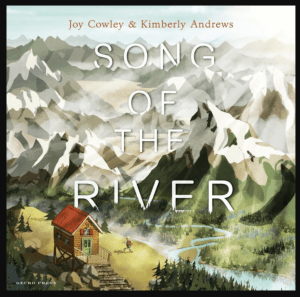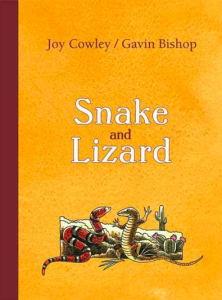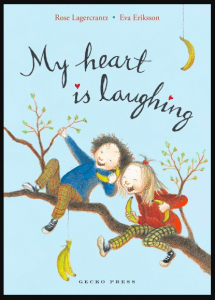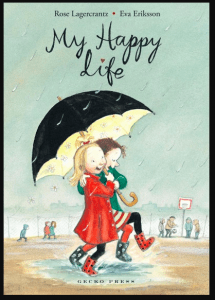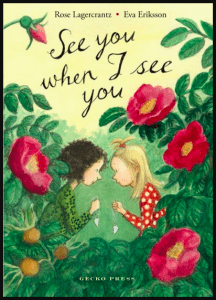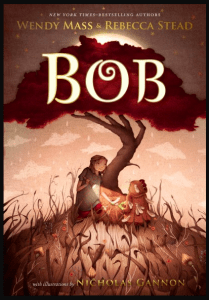Do countries each have their own mood?
Do novels reflect the mood of the author’s country?
New Zealand
Cowley, Joy. Song of the River. Wellington, New Zealand: Gecko Press, 2019.
Where does the sea begin? In a trickle of water, high, high, up in the mountains. In a stream, running between snow-covered ground shaded by pine trees. Where does a stream run? Down, down, joining other streams, turning into a creek and into a river. Where does a river flow? Past farms, under bridges, through cities, joining other rivers to become a wide rushing highway to the sandy salty sea. Illustrated by Kimberly Andrews and written by the award-winning Joy Cowley, this exhilarating picture book about a little boy who lives in the mountains is cheerfully recommended for readers five to eight years old.
Cowley, Joy. Snake and Lizard. La Jolla, Calif.: Kane/Miller, 2007.
This story of two friends who like helping others comes from New Zealand and will be much enjoyed by readers who are fond of Frog and Toad by Arnold Lobel and George and Martha by James Marshall.
Cowley, Joy. Friends: Snake and Lizard. Wellington, N.Z.: Gecko Press, 2011, c2009.
Cowley, Joy. Stories of the Wild West Gang. Wellington, NZ: Gecko Press, 2012.
Michael would far rather be having adventures with his cousins than staying at home with his quiet, proper mum and dad. This lengthy collection of 10 hilarious stories, originally published separately, will appeal to readers who enjoy laughing. A great read-aloud! [New Zealand; Cousins; Humorous fiction; Adventure and adventurers; Family life]
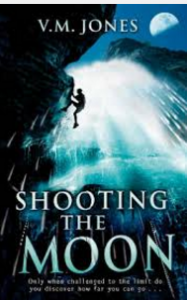
Jones, V.M. Shooting the Moon. London: Andersen Press, 2008.
Pip and his father head into the wilderness of New Zealand on a hiking trip with a group that threatens to disintegrate rather than pull together to survive.
Lagercrantz, Rose. My Heart is Laughing. Wellington, New Zealand: Gecko Press, 2014.
Dani is always happy. Except when she is unhappy. But she does not count those times. This cheerful story about the little adventures of life is filled with quiet wisdom: Don’t give up, even when things seem hopeless. Try to think about something fun when you’re upset. Forgive people. Originally published in Sweden in 2012, this short novel with large print and wide margins is perfect for readers 7 to 10 years old.
Some stories have an intriguing plot line. Some have finely drawn characters. But very few flow beautifully. Lyrically. And that last quality is what turns a novel into a work of art. Rose Lagercrantz’s story – translated into English by Julia Marshall and illustrated by Eva Eriksson – is a true example of writing as art.
What other novels have such rhythm and grace? Kate DiCamillo’s Because of Winn-Dixie. Cynthia Rylant’s Missing May. Joy Cowley’s Chicken Feathers. Patricia MacLachlan’s Kindred Souls. Margery Sharp’s The Rescuers. Katherine Applegate’s Wishtree….
Lagrecrantz, Rose. My Happy Life. Wellington, N.Z.: Gecko Press, 2014, c2013.
Want to teach young readers how to recognize theme in novels? Want to use a novel to start philosophical discussions with 7-year-olds? Read this novel aloud and watch for true-to-life sentences.
Lagercrantz, Rose. See You When I See You. Wellington, N.Z.: Gecko Press, 2017.
This novel continues the Dani series. Although not as full of profound truths about life, it is still greatly entertaining.
Australia
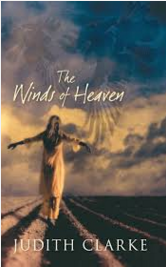
“Left to herself all through the weekdays, Clementine grew bored — bored with the books she’d brought with her, bored with idling around the lake and wandering the narrow tracks that meandered over the empty common and never seemed to get to anywhere except the paddocks and back to the lake again. The little waves still made their old-dog lapping sound among the reeds, the winds of heaven blew, and the clouds in their fantastic shapes still sailed majestically across the sky. On a lonely day that wide sky and those grand sailing clouds could make you feel unreal” (107).
That wistful loneliness in The Winds of Heaven by Judith Clarke (New York: Henry Holt, 2010) is prevalent in many Australian novels. A feeling of being unseen, of living on the periphery of life, of drifting away, unnoticed. Read some stories. See if you find a pattern.
Clarke, Judith. One Whole and Perfect Day. Ashville, NC: Front Street, 2006.
“As her irritating family prepares to celebrate grandfather’s eightieth birthday, sixteen-year-old Lily yearns for just one whole perfect day together.” – CIP [Australia; Brothers and sisters; Family life; Grandmothers; Love; Worry; Young adult fiction]
Clarke, Judith. The Winds of Heaven. New York: Henry Holt, 2010.“Clementine and her cousin Fan both grow up in 1950s Australia but have very different lives, Clementine coming from a stable, city family and Fan from a broken, country home, and their destinies are also strikingly divergent.” – CIP [Alcoholism; Australia; Country life; Cousins; Family life; Historical fiction; Loneliness; Single-parent families; Suicide]
French, Simon. My Brother’s Keeper. Somerville, Mass.: Candlewick Press, 2014, c2012.
Eleven-year-old Kieran tries to be one of the popular kids at school, one of the powerful kids. But what will he do when his cousin arrives in town? His cousin Bon isn’t athletic. He definitely isn’t outgoing or confident. Instead, his cousin is soon the target of those powerful boys who like to bully everyone else. Life becomes even more confusing for Kieran when the girl he admires becomes friends with Bon. It becomes more complicated when he discovers the reason Bon has come to live in his home. This well-written memorable novel from Australia is recommended for readers 10 to 14 years old. [Australia; Bullying; Conduct of life; Cousins; Imagination; Individuality; Jealousy; Moving (Household); Parent and child; Schools]
Hartnett, Sonya. Thursday’s Child. Cambridge, MA : Penguin, 2003. As Harper Flute’s family struggles to survive the Great Depression in a hot dry land, her young brother, Tin, starts escaping into underground tunnels. Winner of the Guardian Children’s Fiction Prize. [Australia, Brothers and sisters; Family life; Farm life; Historical fiction; Poverty; Underground areas]
Marchetta, Melina. Jellicoe Road. New York: HarperTeen, 2010, c2006. “Abandoned by her drug-addicted mother at the age of eleven, high school student Taylor Markham struggles with her identity and family history at a boarding school in Australia.” – CIP [Australia; Abandoned children; Boarding schools; Emotional problems; Identity; Teenagers]
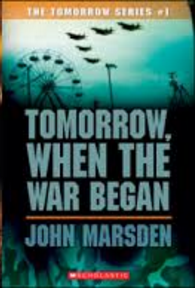
Marsden, John. Tomorrow When the War Began. Pan Macmillan, 1993.
Many vivid images come to mind while reading Tomorrow When the War Began by John Marsden (Pan Macmillan Publishers, 1993 ). One is of a camping site: a deep crater with large granite slabs that drop down step by step to a slight hill covered by plants. In the centre is an area, the size of a hockey field, spotted with trees and inhabited by large snakes and numerous bugs and insects living in the heavy undergrowth. A shallow creek that runs up from Hell to the other side. And that is just one of the many images this book gives me. (Jake in grade eight)
This is the first in a series of seven young adult novels by an Australian author. The stories are told from the point of view of a teenage girl who is part of a guerrilla band fighting an invading army in what has become World War 3.
Mass, Wendy and Rebecca Stead. Bob. New York: Feiwel and Friends, 2018.
Most of the time, I dislike novels written by more than one author. But this one is an exception. Ten-year-old Livy reluctantly visits her grandmother in Australia and discovers a strange creature hiding in her bedroom closet. Why does she feel she somehow knows him? Why does she feel the need to protect him? This charming story is highly recommended for readers 10 years old and up who enjoy mythology. It is easy to read and ends happily.
P.S. I generally dislike stories set in present tense and written from the first person point of view, but this novel is an exception again. But then everything published by Feiwil and Friends tends to be magically endearing. [Animals, Mythical; Australia; Memory; Missing children]
Moriarty, Jaclyn. A Corner of White. New York: Arthur A. Levine Books, 2013.
“Fourteen-year-old Madeleine of Cambridge, England, struggling to cope with poverty and her mother’s illness, and fifteen-year-old Elliot of the Kingdom of Cello in a parallel world where colors are villainous and his father is missing, begin exchanging notes through a crack between their worlds…” CIP “‘We must think outside of ourselves, Madeleine,’ he’d say,… ‘Live for others, not just yourself.’….’If you do not learn this thing,’ her father used to say, ‘people will give up on you. You only get so many chances’” (245-246). The cover is unfortunate. This novel is far better than the cover. Recommended for readers who enjoyed Inkheart by Funke, First Light by Stead or Alexandria of Africa by Walters. [England; Color; Fantasy fiction; Fathers and daughters; Fathers and sons; Friendship; Grief; Magic; Missing persons; Princesses; Runaways]
But here is a story, from Australia, in which the main character is pulled back from drifting away:
Millard, Glenda. The Naming of Tishkin Silk. Farrar, Straus & Giroux, 2009.
Griffin is lonely. While he has a father and brothers and sisters, his mother and baby sister have disappeared. Then he starts school where he makes a new friend, Layla, who enters the magical world of his imagination and teaches him how to open his heart to the truth. This gentle story from Australia will be appreciated by readers of all ages who understand that courage can be quiet and that families can find love even in the midst of grief. [Australia; Death; Family life; Friendship; Grief; Identify; Imagination; Loneliness]
And here is a story that starts in Australia, a story about a boy who floats away from his uncaring family. The author is Irish and while the story starts bleakly, it soon reaches the humorous craziness of many Irish novels:
Boyne, John. The Terrible Thing That Happened to Barnaby Brocket. Toronto: Doubleday Canada, 2013, c2012.
“Barnaby Brocket who is different in one important way (he floats), finds himself on a journey that takes him all over the world and discovers who he really is along the way.” – CIP Quietly and subtly humorous, showing the perseverance needed to survive in a home where one is unwanted. Highly recommended for readers of all ages. [Australia; Courage; Family life; Fantasy fiction; Humorous stories; Individuality; Self-realization; Voyages and travels]
